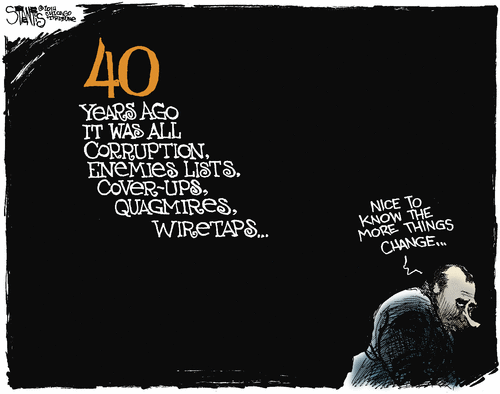QUOTE OF THE DAY
NY Times: Has the ‘Libertarian Moment’ Finally Arrived?
“Let’s say Ron Paul is Nirvana,” said Kennedy, the television personality and former MTV host, by way of explaining the sort of politician who excites libertarians like herself. “Like, the coolest, most amazing thing to come along in years, and the songs are nebulous but somehow meaningful, and the lead singer kills himself to preserve the band’s legacy.
“Then Rand Paul — he’s Pearl Jam. Comes from the same place, the songs are really catchy, can really pack the stadiums, though it’s not quite Nirvana.
“Ted Cruz? He’s Stone Temple Pilots. Tries really hard to sound like Pearl Jam, never gonna sound like Nirvana. Really good voice, great staying power — but the whole is not greater than the sum of its parts.”
Forbes: No, Obamacare Has Not Reduced Insurance Costs
Has Obamacare reduced the cost of insurance? Pundits, analysts, and academics have pored over this question relentlessly. While people on different sides of the political spectrum place value on different things (liberal-progressives value equity much more than libertarians), it’s difficult to make the claim that insurance costs havefallen under the health care law, something that even liberal analysts have had to concede. As Vox’s Adrianna McIntyre conceded, “Obamacare’s sticker shock is real, but it’s not as bad as advertised.”
Various elements of the law, including guaranteed issue, limited age-rating, and a more comprehensive benefits package, all contribute to higher underlying insurance costs. Of course results will vary depending on the methodology used to analyze costs. But nevertheless, costs have moved in an upward, not downward, trajectory.
Wall Street Journal: How Millennials Are Poised to Help the Housing Recovery
Because the meltdown in housing was at the center of the financial crisis and subsequent Great Recession, much attention during the recovery has been focused on the pickup in single-family housing starts.
Starts plummeted from an annual rate of 1.4 million units in 2007 to about 300,000 in 2010. Since then, they have been climbing back slowly and were within striking distance of an annual rate of 600,000 in June. While it is unreasonable to expect starts to return to the pre-recession high–which was inflated by unrealistic expectations about further price increases and lax mortgage-underwriting standards–the housing recovery clearly has a ways to go.
Worrywarts are concerned that impending increases in interest rates will crimp housing prices and thus the rate of new single-family starts. But as Mark Carter, a senior researcher at the Federal Reserve Bank of Atlanta, wrote earlier this year, the good news is that there is huge pent-up demand from millennials who have delayed buying a house until they believe the economy’s improvement is for real.
Wall Street Joural: Fed Survey: A Third of Americans Say They’re Worse Off Post-Recession
More American households say they are worse off rather than better five years after the recession, a new Federal Reserve survey found.
The report, released for the first time on Thursday, found 34% of households said they were “somewhat worse” or “much worse” financially in 2013 compared to 2008. Only 30% reported being better off to some degree.
Considering that respondents were asked to compare their incomes to 2008, during the depths of the recession, “the fact that over two-thirds of respondents reported being the same or worse off financially highlights the uneven nature of the recovery,” the Fed report said.
Forbes: Governor Quinn Tries To Fool Illinois Tax Payers
Last week, Illinois Governor Pat Quinn signed a bill that places on the November 4 ballot a non-binding tax referendum that has many of us scratching our heads. If Governor Quinn is truly interested in finding out how voters feel, then the fuzzy language of the referendum will not serve him well. What seems to be crystal clear is that, in light of the state’s economic crisis, the governor hopes to drive more of his supporters to the polls on Election Day.
And it looks like Governor Quinn has every reason to be worried. On the same day that Quinn signed the bill into law, a Rasmussen pollshowed that the Republican challenger, Bruce Rauner, had a five-point lead, an additional two percentage points higher than in April.
The race for Illinois’ top elected office is one of the most interesting political battles in the country. The two candidates could not be farther apart in their visions for curing what ails the state. As reported two weeks ago in this column, Illinois’ financial woes issues have positioned the state on the brink of economic disaster.
Politico: Obama’s endangered home-state governors
The Democratic governors running President Barack Obama’s adopted state and childhood home could be headed for embarrassing electoral defeats this year, despite increasingly active assistance from the White House.
Illinois Gov. Pat Quinn trails Republican businessman Bruce Rauner in recent polls, while Hawaii Gov. Neil Abercrombie is being crushed in sparse polling ahead of this Saturday’s Democratic primary against a little-known state senator, David Ige. And even if Abercrombie wins on Saturday, he starts the race behind Republican Duke Aiona, thanks in part to a third candidate on the ballot.
Both incumbents could still win reelection, but experts say the fact that they’re struggling — and even trailing — is, in part, a sign of Obama’s waning political influence in his home and native states and proof that presidential endorsements only go so far.
Washington Post: Where have all the entrepreneurs gone?
We may have a “senile economy,” says economist Robert Litan of the Brookings Institution. That’s senile as in old, rigid and undynamic.
We are taught otherwise. Americans are reared on the notion that we’re the most entrepreneurial of peoples — and many success stories seem to prove it. There’s a long legacy from Thomas Edison to Mark Zuckerberg. Our economy is constantly kept young by the “next new thing.”
Litan dissents. What’s happening now, he says, is that the economy is increasingly dominated by older firms tied to proven products and familiar business methods. Litan is not just blowing smoke. In a new study, he and Ian Hathaway measured the age of U.S. businesses. They were astonished by what they found: From 1992 to 2011, the share of U.S. firms that were 16 and older jumped from 23 percent to 34 percent.
Chicago Sun Times: No pension reform? Then no funding increase
This is the time of year when newspapers send questionnaires to the candidates for governor and then follow up with interviews. The process gives candidates the opportunity to show they can think about and respond to the questions, thereby helping voters decide which candidate to support.
Here’s the question I’d put at the top of my list. Indeed, I think it may be the most important question any candidate for high office in Illinois has had to face in our lifetimes. If a candidate ducks it — or brushes it off (“I wouldn’t want to speculate on what the court might do.”) — he doesn’t deserve support. The people of Illinois should be told the truth about what’s likely to be in our near future.
Question: Many people think the Supreme Court of Illinois will invalidate the recently enacted state pension reform law on the grounds that pensions are contracts that can’t be diminished, even though the state is in an increasingly desperate fiscal condition. If that happens, we’ll be left with the pre-reform law — with current unfunded obligations of the five state pension systems amounting to an estimated $100 billion. (Toss in an extra $35 billion or so for unfunded retiree health care costs.) We’ll also be back to a funding system that has shown itself to be totally inadequate because it’s not based on actuarial estimates. The amount of underfunding will continue to grow until the pension systems go belly-up.
CARTOON OF THE DAY

